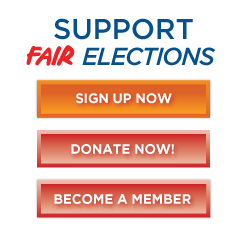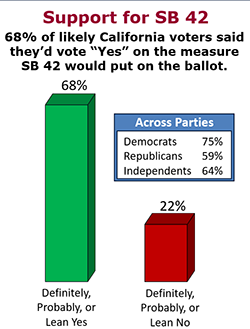The public is increasingly dismayed by the torrent of
political ads bombarding airwaves and mail boxes at
election time. The year 2016 is expected to be a
record-breaking year, with estimated expenditures of $3.5
billion.
The Koch Brothers' network alone has announced a 2016
campaign budget of $889 million.
But the U.S. Supreme Court invalidated spending limits in
1976 in Buckley v. Valeo, ruling that political spending
was a form of free speech and thus enjoyed the highest
level of protection. Plus, the courts have ruled that
corporations have many of the same rights that people have,
although there are active movements for a U.S.
constitutional amendment to change both of those
rulings.
It got much worse in 2010 with the Citizens United
decision, allowing unlimited anonymous donations by
corporations and individuals to independent expenditure
committees (not coordinated with candidates'
campaigns).
This opened the floodgates.
One important partial solution would allow us to know just
who -- or, more often, which corporations -- are funding
the ads.
In March, our own Assemblyman Marc Levine, and Assembly
Appropriations Committee Chairman Jimmy Gomez, introduced
AB 700, the Disclose Act.
The Disclose Act would require the top three original
funders of every ad to be clearly stated, in readable type
if in print, and for adequate time if over the
airwaves.
The "dark money," as it is called, would have to come to
light.
Currently, the required disclosure states only the name of
some made-up committee, a name that may be downright
misleading.
For instance, in November we were subjected to innumerable
ads against Proposition 45, which would have put some
constraints on health insurance premium increases by
allowing them to be vetoed by our state insurance
commissioner, as he does for other insurance increases, and
as most other states allow.
Many of these ads opposing this measure ostensibly came
from "Californians Against Higher Health Care Costs." But
who really paid for these ads? Health insurance companies
-- Kaiser, Wellpoint and Blue Shield of California -- were
the top three.
Frequently, ballot measures head into the final month
before an election leading in the polls by big margins.
They are then blasted with negative ads funded by special
interests but under phony names -- and lose.
Might the outcome have been different in the case of 2006's
proposed oil severance tax if, instead of "Citizens Against
Higher Taxes," the top funders of the ads were revealed as
Chevron, Aera Energy and Occidental Oil and Gas?
What about 2012's losing GMO labeling initiative? Shouldn't
we have been told that the "Coalition Against the Costly
Food Labeling Proposition" was actually funded primarily by
Monsanto, Dupont and Pepsico?
Here, even the Supreme Court is with us. Along with the
Citizens United decision, eight of the nine justices noted
the problems that result when groups run ads "hiding behind
dubious and misleading names." Disclosure, they said, was
necessary to provide "information needed to hold
corporations and elected officials accountable for their
positions and supporters."
Syndicated columnist Thomas Elias calls the Disclose Act
the most important bill in Sacramento this year, and over
80 percent of both Democratic and Republican voters support
it. It passed the Assembly Elections Committee last month
and next will go to the Assembly Appropriations
Committee.
An almost identical bill last year, also called the
Disclose Act, was supported by 400 organizations, including
the League of Women Voters, Common Cause, the Sierra Club
California, along with many newspapers, and statewide
leaders. It passed the state Senate 28-11, and after
passing two Assembly committees, was withdrawn just before
its scheduled vote on the Assembly floor because of
last-minute opposition and a shortage of a few votes.
This year's Disclose Act (AB 700) is sponsored, once again,
by the California Clean Money Campaign, and you can add
your support and/or donate to the cause at www.CAdisclose.org.
Ironic as it is that we need to raise money to neutralize
the effect of big money in politics, we do.
You can also come to a party at my house on May 23 to
support this cause.
Contact me at 415-717-7056, or at greg@marinlawcenter.com
for details.
Attorney and former San Rafael City Councilman Greg
Brockbank owns Marin Law Center. He is a former College of
Marin trustee.



